#Gloom is not the same thing that I'm using here in LU
Text

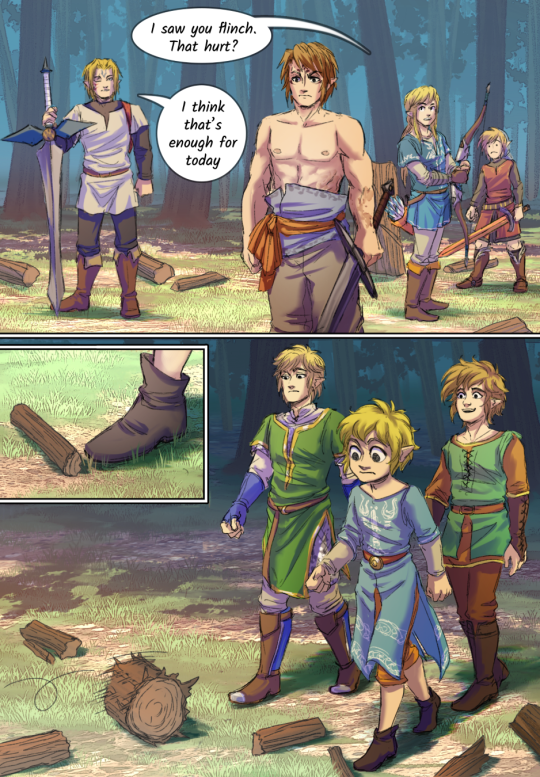
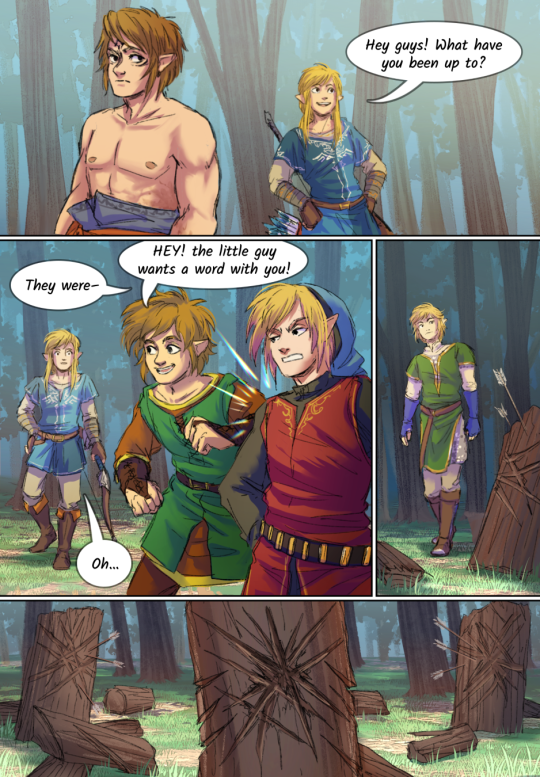
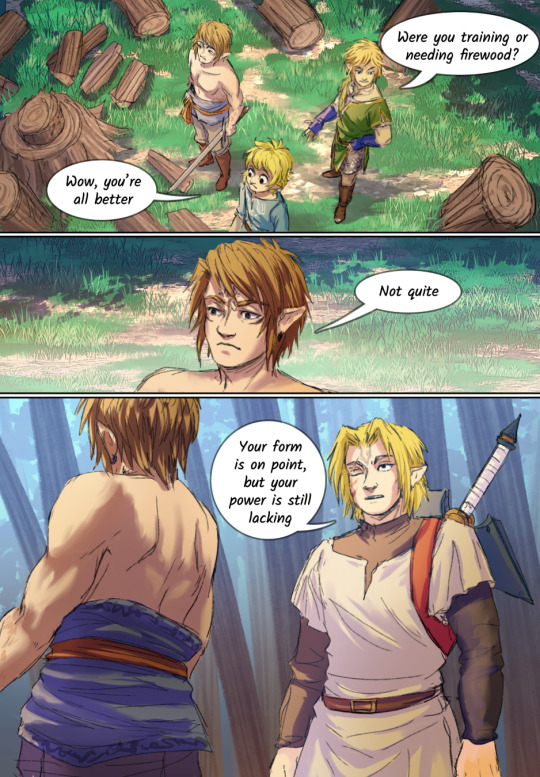
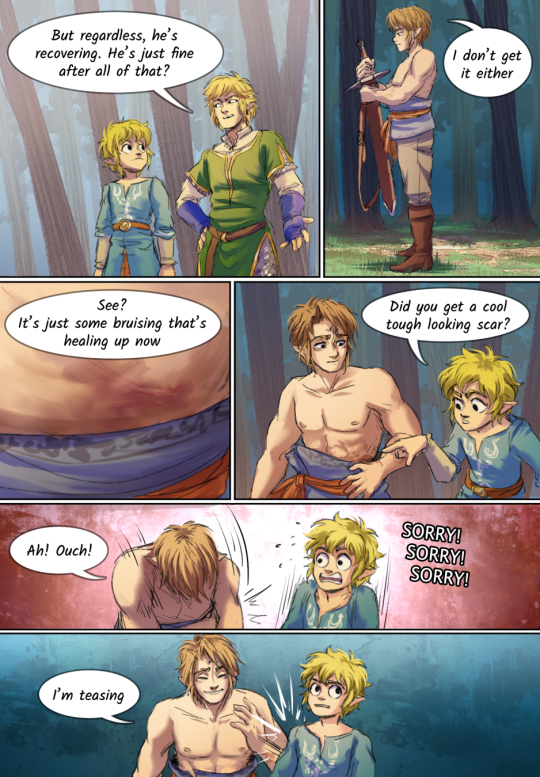
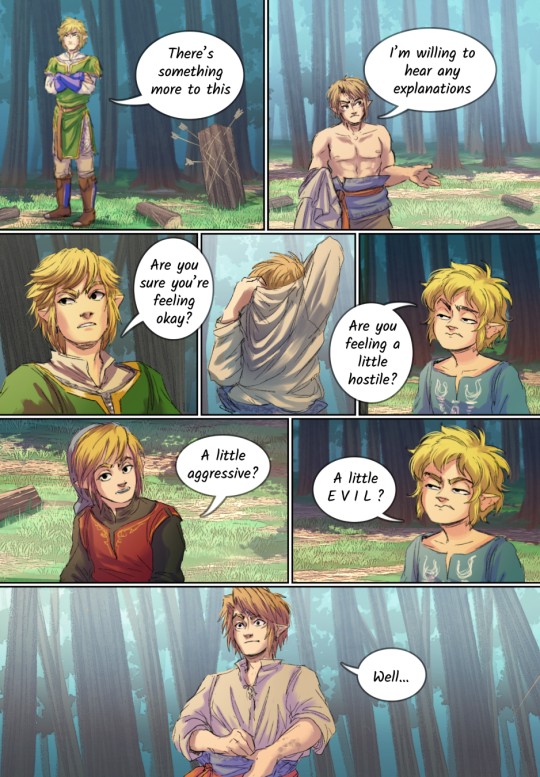
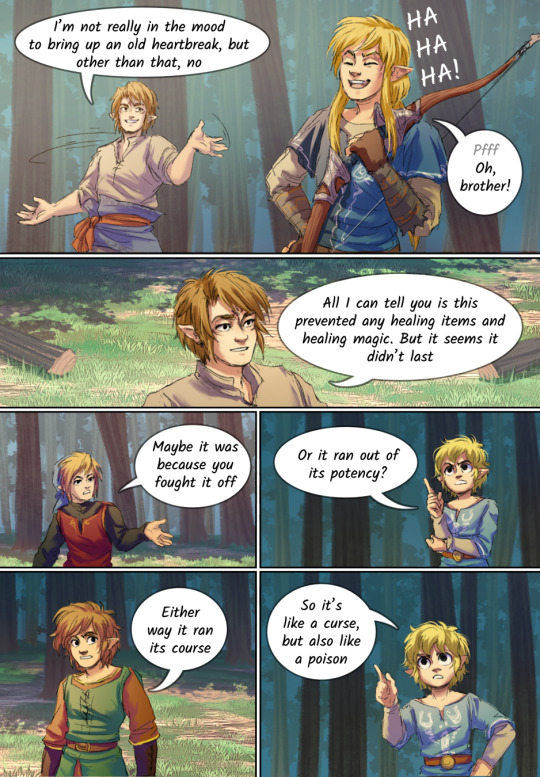
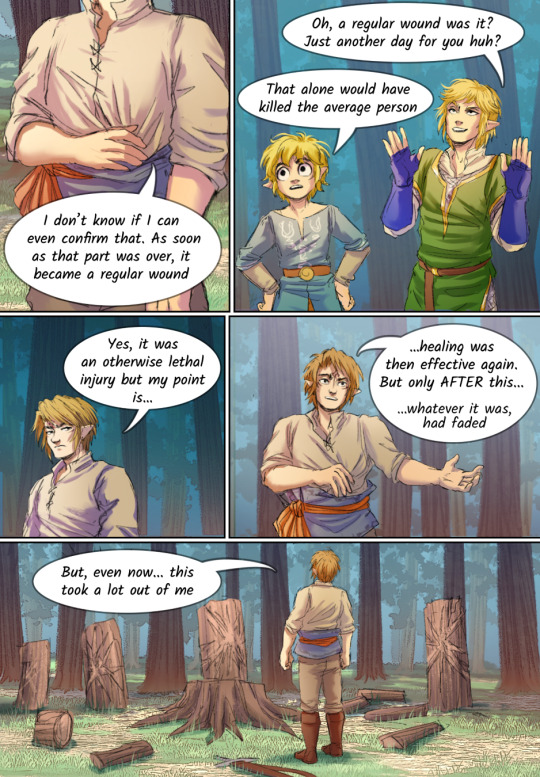
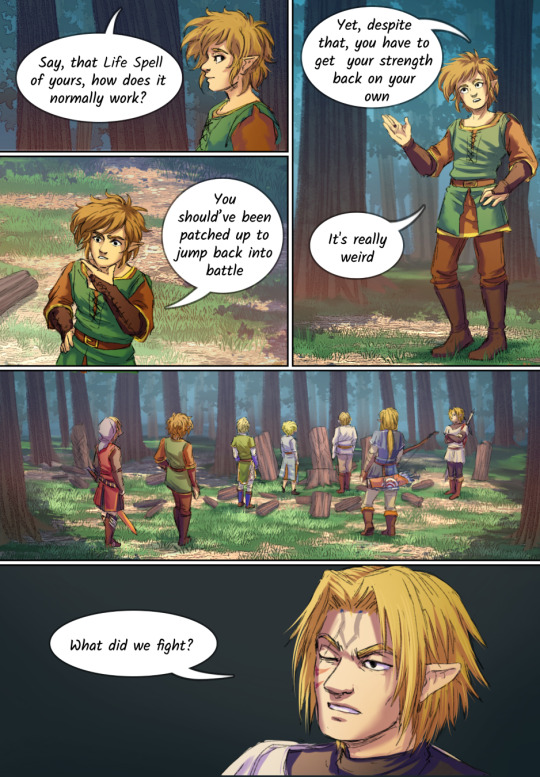
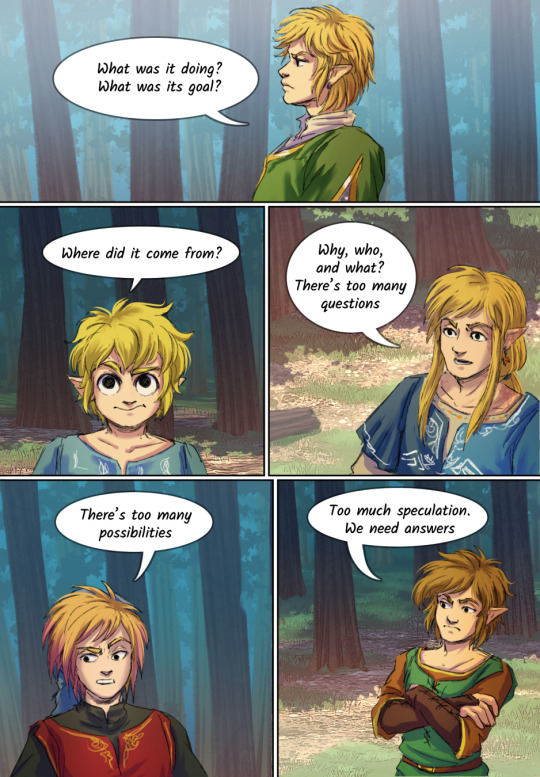
Dawn pt. 5
<<Previous Next>>
Archive/ About / Linktree
#linkeduniverse#creator content#I remember writing this scene for the sole purpose of clarifying Twilight's wound#But now that we have Gloom from TotK the idea of a weird injury/sickness is not so out of place now.#Gloom is not the same thing that I'm using here in LU#but it's far easier to explain something like this now that the zelda audience has been introduced to a similar concept#Yay for me
7K notes
·
View notes
Note
Do you do psychoanalyzing on other characters besides Yi Sang and Hong Lu? If so I’d like to hear you talk about Don and Faust, and why you think they share 2 egos (Telepole and Fluid Sac)
I mean! I can certainly try! Hong Lu and Yi Sang are just. I guess my field of expertise??? Since I care the most about those two??? But I can certainly try to analyze some other characters, though it might not be able to be as specific and detailed as I am when analyzing my favorites. Hope you understand!
Now then. Let's do this. Under cut we go as usual.
Fluid Sac
Let's start with the one we know less about, aka Headless Ichthys. In fact, we know... very, very little about Headless Ichthys.
Due to Meursault being the one to write the logs about this abnormality, we only get information on its physical characteristics, such as it having lost its head, and that there's something inside its sack that is said to bear resemblence to either a flower or a human nervous system.
That's it. That's all the definitive info we have on this abnormality. We can assume that it has Some religious significance due to its name, Ichthys, being the name of a religious fish symbol, but that doesn't help too much.
There is something interesting I want to note here, and that's the thing inside its sack. The fact that it's unclear whether it resembles a flower or a human nervous system is interesting... Because that mimics what Lunacy looks like. While Lunacy is described as rose-shaped by its Inventory description, the full Lunacy icon can also be interpreted as a brain on a brainstem.
I suppose, if you wanted to dig deep enough, the implications of it containing a symbol akin to Lunacy and having lost its head could could be interpreted as the abnormality being a symbol of a descent into madness. Which, honestly, that's the best I got from what little we have.
Because of just how little lore we have on the Headless Ichthys, unfortunately I can't go too in depth on Don and Faust with it in mind... But I'll still try.
Fluid Sac is a Gloom E.G.O, and though Gloom is one of those Sins I'm not entirely sure of, it does seem to represent taking actions due to one's built up negative emotions.
The main base E.G.O examples we have are Snagharpoon, which has Ishmael follow her compulsion to keep searching for "That bastard", and Land of Illusion, which implies that Hong Lu retreats from reality into his own dream world under heavy emotional stress.
As such, I'm going to go out on a limb and say that Fluid Sac signifies something that caused horrible emotional stress to both Don and Faust, which would then kickstart their descent into madness. In more specific terms, this would be heroic delusions for Don and single-minded mad scientist-esque pursuit of knowledge for Faust.
As a brief sidenote, this would align quite well with the visual design differences between the two. Though the E.G.O outfits they wear are extremely similar, all the way down to both of them having green tints in their hair and fin decorations in the exact same spots, there are two notable differences.
One - the shape of the weapon. Don's weapon is shaped like a miniature Headless Ichthys clutching onto a perfectly round sack-orb. It looks almost more like a toy rather than a weapon. Faust's weapon is not only shaped almost perfectly like Headless Ichthys's sack, it also seems to have the same properties, as it bursts during Faust's Awakening attack animation.
Two - the article of clothing that mimics the Ichthys's hand-flippers. For Don, it's a cape-like piece of clothing that looks more like something you'd see on a kid's hero costume. For Faust, it's seemingly anatomically-correct recreations of the flippers that are attached to her jacket.
Both of those I think reinforce the idea of Don and Faust indulging in their methods of madness. Child-like obsession with heroism for Don (using toys and costumes), and endless scientific pursuits for Faust (only someone studying the abnormality closely could replicate its anatomy in this much detail).
It's a bit hard to tell anything from their dialogue lines as they are somewhat generic (my unrelated theory on that is that Fluid Sac is one of the first E.G.Os designed, based on its dialogue lines not having much to do with its abnormality, and due to its attack animations being uncharacteristically sparse in actual frame-to-frame animation), but they do seem to work as good reflections of Don and Faust in general.
Their Awakening lines seem to reflect their general attitudes, with Don's being jovial yet quick to resort to violence, and Faust's being self-assured and seemingly trying to predict all outcomes.
Their Corroded lines on the other hand could be a reflection of their attitudes after their descent into madness began. Don's single-minded "...Crush them." could be a reflection of how she views morality as black and white, and thus believes all that she considers 'villains' should be crushed by her. Likewise, Faust's line here implies that she's willing to do anything, even leave herself completely empty by 'disgorging everything', if it means she reaches what she's looking for.
Looking at the Sin Resources, both Faust and Don require Gloom and Lust to use Fluid Sac, and while Don also uses Pride, Faust uses Envy instead.
I already mentioned what I think Gloom means for Fluid Sac, and I think it being a requirement further reinforces it here. Both Don and Faust need to be acting under severe emotional stress to start their descent into madness.
Lust as a sin seems to represent acting according to one's desires, or more specifically, indulging in them. It also tends to have slight spiritual connotations in Limbus, making it the Sin of acting for the sake of some form of personal fulfillment as well.
Using it for Fluid Sac would make sense with the descent into madness interpretation. For both Don and Faust, their forms of madness are them overindulging in something they find personally fulfilling - heroism for Don, science for Faust.
Don's unique Sin requirement here is Pride. I already went into detail on what Pride as a Sin means in Limbus in the Dimension Shredder post, but to recap, Pride represents actions taken for their personal benefits, while ignoring their negative consequences on either other people or oneself.
This very much represents Don's madness quite well. Her heroic acts are rooted in what she personally perceives as doing good, and she completely ignores the collateral damage that she may cause in the process. Her willful ignorance of the harm she inflicts on others is one of the main things that led her to her personal form of madness.
Faust's unique Sin requirement here is Envy. Now, I won't go into detail on Envy just yet, as it's better saved for Telepole, but in very basic summary, it represents actions done in reaction to other people and their actions.
While there is still much we don't know about Faust, the inclusion of Envy as a requirement for her Fluid Sac implies that the root of her madness actually comes from someone else. There's not enough info for us to speculate on more details... but something tells me this might have to do with a certain Faustian Bargain, if you catch my drift.
So, that's Fluid Sac! For something with so little to dissect, it ended up leading to quite a good bit of analysis anyway! Call me Game Theory cause I'm about to put MatPat out of a job.
Telepole
Alright, let's once again start with the abnormality itself - Alleyway Watchdog.
The funny thing is that the Watchdog has the opposite problem to the Ichthys, as while the fish had very little lore, the Watchdog has a decent amount, but it's written by Yi Sang and as such it's hard to tell how much of its logs are facts, and how much is Yi Sang being Yi Sang and projecting onto the dog.
If there is one thing that is a definitive fact, it's that lack of being able to control oneself and being unable to tell who is controlling who is a recurring theme for this abnormality. The fact that it's unclear if the dog is in control of its own actions calls back to it, and the further muddling of what actually is in control of it only further adds to that theme.
It's unclear if the charred person on its back is controlling the dog, or if it's simply along for the ride unable to do anything to stop it, or if it is also under the control of something else. It's unclear if electricity is what is directly controlling the dog, or if it's something Yi Sang is projecting onto it due to his own experiences.
With that in mind, let's look at the three Sinners who have this E.G.O - Don, Faust, and Heathcliff. Now, I won't be looking at Heathcliff's case too closely, since this is meant to focus on Don and Faust, but I will be bringing him up when talking about Telepole on a general level, so that we have the biggest sample size possible.
In this case, having the Telepole E.G.O would imply these three have some issues when it comes to control, whether it's they themselves lacked control in their life, or whether it's their own degree of perceived control isn't as it seems. Since neither of those three have had their Cantos released yet, it's impossible for me to tell what exactly is going on here, but this is something to keep in mind.
Now, let's talk about Envy, as that's the Sin damage that all of the Telepoles deal. Envy appears to represent actions one takes as a reaction to what others do. This can take any form, whether it's revenge or following orders or being provoked or anything really. What's important here is that the action taken is a Direct Response to someone else.
The only base E.G.O that deals Envy damage is Heathcliff's Bodysack, which represents his impulsive and likely violent reaction to whatever Cathy did to him.
This all fits very nicely with the nature of Alleyway Watchdog, and Telepole E.G.O as a whole. The Watchdog's actions are all reactions to something else controlling it. Likewise, those using the Telepole E.G.O have their actions be influenced or even controlled by someone else.
Their Awakening lines (since there's nothing to analyze when it comes to their Corroded howls I don't think) all reflect a certain part of their personality, potentially implying that something about that is due to the influence of someone else.
Heathcliff's line expresses his impulsively violent tendencies, Don's ties back to her blind heroism, and Faust's has a clinical, detached feel to it.
As for Sin Resources, both Faust and Heathcliff use Envy, Wrath, and Lust, while Don exchanges Lust for Gloom.
Envy as a Sin Resource here once again ties back to the themes of control, implying that for all three, the actions they take are not entirely Just their own. Whether it's provokation or suggestion or something else, for all three of them, their actions are being encouraged, if not directly controlled, by someone else entirely.
Wrath is... hard to analyze. Partially because on first glance it seems to act as a shorthand for fire damage, and partially because no base E.G.O deals Wrath damage. My best guess based on other E.G.Os is that Wrath represents actions done out of self-righteousness. It's the "I deserve to do this, I DARE to do this." of Sins, in my opinion.
It's not necessarily tied to literal anger, as its name might imply, but rather a deeper reason that usually leads to anger - that being the idea that something should or shouldn't happen simply because you wish it so. After all, the most common reason for anger is for something to not go your way. Think children throwing tantrums over their toy being taken away, or a gamer smashing their keyboard over getting outplayed.
With all that being said, Wrath being used for Telepole could have several meanings. It could represent defiance, the idea that the Sinners act out because they believe they deserve better than the person trying to control them. It could also represent temptation, falling under someone else's control or provokation due to believing that they deserve something they don't have or to do something they can't without falling for it.
Now onto the more unique Sin resource requirements. Faust and Heathcliff both require Lust, a Sin representing indulging one's desires and seeking personal fulfillment. This would fit both Heathcliff and Faust, as their Telepoles seem to allude to the things they are already impulsive about - mindless violence for Heathcliff, and pursuit of knowledge for Faust. The actions they are being controlled or provoked to do are things they already wish to indulge in. Perhaps in their case, they are specifically being tempted into doing something, rather than being directly forced.
This however, is different for Don. Don's Telepole requires Gloom, which is a Sin representing actions done out of succumbing to negative emotions. This paints the actions she's controlled or provoked into comitting in a different light. Unlike Heathcliff or Faust, she isn't being tempted by personal fulfillment. No, in her case it's an expression of emotional stress. Perhaps in her case the control is much more forceful, causing her to act out, or perhaps her actions are a reaction to something bad happening to someone she knows. Either way, it's quite intriguing to note.
Unlike my Fluid Sac analysis, which I could get a little bit more detailed on thanks to touching on a facet of Don and Faust's personalities that are clearly evident, Telepole seems to more so reference their pasts, something that as of right now we simply have no access to.
I expect reaching Heathcliff's Canto will help a ton in this specific case, as it will help analyze the rest of the Telepoles thanks to being able to compare what it seems to reference in his revealed past to potentially similar events in both Don and Faust's pasts.
#limbus company#limbus company project moon#don quixote#don quixote lcb#faust#faust lcb#lcb analysis#fluid sac ego#telepole ego#ask#anon#lu speaketh#the only reason this one is longer is because i did two egos in one post
83 notes
·
View notes
Note
Thanks for the analysis post! It's neat to see your interpretations, and is definitely helping me sort out my own(I was struggling with wording mine). I'd like to share my take/understanding on passives/supports, because I think characters who use different resources depending on whether it's passive or support are really, really interesting. (Plus I am still staring directly at Outis' LCB and G Corp needing Sloth. I want to know what is going on with that old woman)
I think passive/support sins mesh with the actual passive/support's mechanics themself and are meant as an explanation for why this occurs. Character analysis wise, I think it could be used to specify and solidify motivations for certain actions the character takes.
The best example I can use for this is Gregor, since 3/5 of his IDs heal HP. To abridge all of my understanding of the specific sins each ID needs for their passive/support: LCB Gregor's s1 Gloom has to do with, as you mentioned, his experiences of being a war vet, G Corp's s1 Gluttony has to do with his endless will to survive and continue fighting, and RB Gregor's s1 Lust is all about how impulsive this Gregor can come off as when it comes to food.
So like, all three of them have the same passive, with LCB Gregor's costing 3 for both passive and support, while G Corp's and RB's cost 4 for passive, G Corp costing 4 for support and RB 5.
So like. Why does Gregor heal in the first place? I think it's cannibalism for all three of them, with G Corp being much more aggressive about it when he's afraid of dying, and as such healing after clashes, not at combat start.
However, all three of them have a different reason for doing so- LCB's passive is quite literally labeled 'Forced Survival,' after all, and I think it's rather self-explanatory for his Gloom. G Corp's is gluttony because it's specifically the 'survival' gluttony- G Corp Gregor has resigned himself to the war, but he still wants to live. And finally, RB Gregor is lust because of his impulsivity and his want to make good food, to try the ingredients.
I think passive/support activation costs have a similar meaning to EGO cost as well? Because I'm sure RB Gregor really doesn't want to support Ryoushuu, but if he's convinced by his lust enough, he will. As much as LCB Gregor might hate it, he doesn't tend to resist things that happen to him and could fall to gloom and habits from his days as a soldier easily.
I also wanted to touch on characters who passives/supports did different things, but are fueled by the same sin- for instance, TingTang Hong Lu's Gluttony. Either way, he gets something out of it to satisfy his want for something interesting, though how he goes about doing it is different depending on if it's for himself or for someone else. But yeah. Sorry for the ramble in your ask box, just wanted to share a fun thought I've had.
(I've been also trying to figure out the EGO weaknesses for a while and I remember seeing an interpretation of them, but I can't remember what it was atm- something to do with being literally weak to that type of emotion, I believe?)
I think that you might legit be onto something here! No, yeah, all that you're saying here makes sense! The one thing I would argue is what LCB Gregor's healing passive represents - I think it has more to do with his bug arm constantly regenerating even against his will, which I think still makes it fit under the Gloom category, considering how his arm's behavior can be interpreted as an allegory of his PTSD.
But no, yeah, this all makes sense to me. Thanks a lot for sharing, my brain was running on fumes by the time I got to actually explaining how Sins work with Identities and E.G.O, so I didn't have the energy to actually take a moment and think about how all of that could apply properly.
When it comes to E.G.O Sin Resistances, I think the main point I want to figure out is whether they represent a Sinner's outward resistances or inward resistances, if that makes sense? Like, does it represent how they react to other people's actions fueled by those Sins, or does it represent how they react to the internal influence of those Sins?
So, if you don't mind me hijacking your own ask to talk about Sin Resistance quirks, I'm gonna just. Talk about them and see if we can figure some of these out together. Under cut cause... it got long.
EDIT: APPARENTLY THE SOURCE I WAS USING FOR REFERENCE ON SOME OF THIS WAS JUST STRAIGHT UP FUCKING WRONG SOMETIMES???? Anyway I'm fixing some of the accidental misinfo.
For one - the amount of Fatal/Endure/Ineffective resistances depends on the threat level of the E.G.O.
All E.G.O thus far have two Fatal resistances. All Zayin E.G.O have one Endured resistance. All Teth E.G.O have one Ineffective resistance (except for Red Eyes Ryoshu, which follows the pattern of Zayin E.G.O). All He E.G.O have both one Endured resistance and one Ineffective resistance.
Here are some other patterns I've noticed.
All Zayin E.G.O Endure Sin damage of the same type as that E.G.O's Sin affinity.
Most Teth E.G.O work the same way, just with having the resistance to their own Sin affinity be set as Ineffective instead. However, there are actually some exceptions here!
Those notable exceptions are:
- Red Eyes Ryoshu (who Endures it like a Zayin)
- Sunshower Outis (Sloth is Ineffective against her, while Gluttony is Normal),
- You Want To Get Beat? Hurtily? Meursault (Pride is Ineffective against him, while Envy is Normal)
- AEDD Heathcliff (Wrath is Ineffective against him, while Gloom is Fatal)
Most He E.G.O follow the pattern of Teth E.G.O, having the resistance to their own Sin affinity be Ineffective. Just like Teth E.G.O however, there are some exceptions.
Those are:
- Sunshower Yi Sang (Gluttony is Ineffective against him, while Sloth is Endured)
- AEDD Gregor (Wrath is Ineffective against him, while Gloom is Fatal)
Another pattern is that E.G.Os of the same Abnormality of the same threat level always have the exact same Sin resistances.
When it comes to E.G.Os of the same Abnormality but different threat level, usually there is still some overlap in resistances.
Specifically:
- Sunshower share their Fatal resistances (Wrath and Lust), while different in their Ineffective resistances (Sloth for Outis, Gluttony for Yi Sang). Notably, Sunshower Yi Sang Endures Sloth, the Sin that's Ineffective against Sunshower Outis.
- Fourth Match Flame, Capote and AEDD all share both Fatal and Ineffective resistances between their Teth and He counterparts.
- Ryoshu's two Red Eyes E.G.O have only one overlap, that being Fatal to Pride.
Notable overlaps between the Sinners' Base E.G.Os and their other E.G.Os:
- Yi Sang's Base E.G.O Endures Sloth (Sunshower, partially Wishing Cairn which has Sloth as Ineffective) and is Fatal to Gloom (Wishing Cairn, Fourth Match Flame) and Envy (Dimension Shredder).
- Faust's Base E.G.O Endures Pride (Telepole) and is Fatal to Lust (Hex Nail) and Gluttony (Telepole). Notably Fluid Sac has no overlap, instead having some resistances as opposite to it (Fatal to Pride, Endures Lust).
- Don's Base E.G.O Endures Lust (Fluid Sac, partially Lifetime Stew which has Lust as Ineffective) and is Fatal to Wrath (no current overlap) and Gloom (Lifetime Stew). Notably Fluid Sac has an opposite resistance to it (Gloom Ineffective), while Telepole has no overlap.
- Ryoshu's Base E.G.O Endures Lust (Red Eyes) and is Fatal to Gluttony (Red Eyes) and Envy (no overlap). Notably both Red Eyes (Open) and Fourth Match Flame have no overlaps, instead both having some resistances as opposite to it (Red Eyes (Open): Endures Gluttony, Envy Ineffective; Fourth Match Flame: Endures Envy).
- Meursault's Base E.G.O Endures Pride (Pursuance, partially You Want To Get Beat? Hurtily? which has Pride as Ineffective) and is Fatal to Lust (Pursuance, Capote) and Gluttony (Pursuance). Notably Capote has an opposite resistance to it (Endures Gluttony), while Pursuance is a near-perfect match.
- Hong Lu's Base E.G.O Endures Gloom (no overlap) and is Fatal to Wrath (Roseate Desire, Dimension Shredder) and Envy (Dimension Shredder). Notably all his current E.G.O share Fatal resistance to Wrath.
- Heathcliff's Base E.G.O Endures Envy (partially Telepole which has Envy as Ineffective) and is Fatal to Lust (no overlap) and Gluttony (Telepole). Notably AEDD has no overlap.
- Ishmael's Base E.G.O Endures Gloom (no overlap) and is Fatal to Lust (Capote) and Sloth (Ardor Blossom Star). Notably Roseate Desire has no overlap, and all her non-Base E.G.Os have opposite resistances to it (Roseate Desire: Lust Ineffective; Capote: Fatal to Gloom; Ardor Blossom Star: Endures Lust, Fatal to Gloom).
- Rodya's Base E.G.O Endures Pride (no overlap) and is Fatal to Gloom (Fourth Match Flame) and Envy (no overlap). Notably Rime Shank has no overlap, and all her non-Base E.G.Os have opposite resistances to it (Rime Shank: Gloom Ineffective; Fourth Match Flame: Endures Envy).
- Sinclair's Base E.G.O Endures Gluttony (no overlap) and is Fatal to Wrath (no overlap) and Pride (no overlap). Notably none of his non-base E.G.O overlap with it, and Impending Day has an opposite resistance (Wrath Ineffective).
- Outis's Base E.G.O Endures Pride (no overlap) and is Fatal to Lust (Sunshower) and Envy (no overlap). Notably Ya Sunyata Tad Rupam and Ebony Stem have no overlap, instead having opposite resistances to it (Ya Sunyata Tad Rupam: Lust Ineffective; Ebony Stem: Fatal to Pride).
- Gregor's Base E.G.O Endures Sloth (no overlap) and is Fatal to Gloom (AEDD) and Envy (no overlap). Notably Legerdemain and Lantern have no overlap, and both Legerdemain and AEDD have opposite resistances (Legerdemain: Fatal to Sloth; AEDD: Fatal to sloth, Endures Envy). Another interesting note is that Legerdemain and Lantern overlap with each other in being Fatal to Wrath, and partially overlap in their resistance to Gluttony (Endured for Legerdemain, Ineffective for Lantern).
What does any of this mean...? Shrugs. I gave you the info, do whatever you want with it I guess.
41 notes
·
View notes